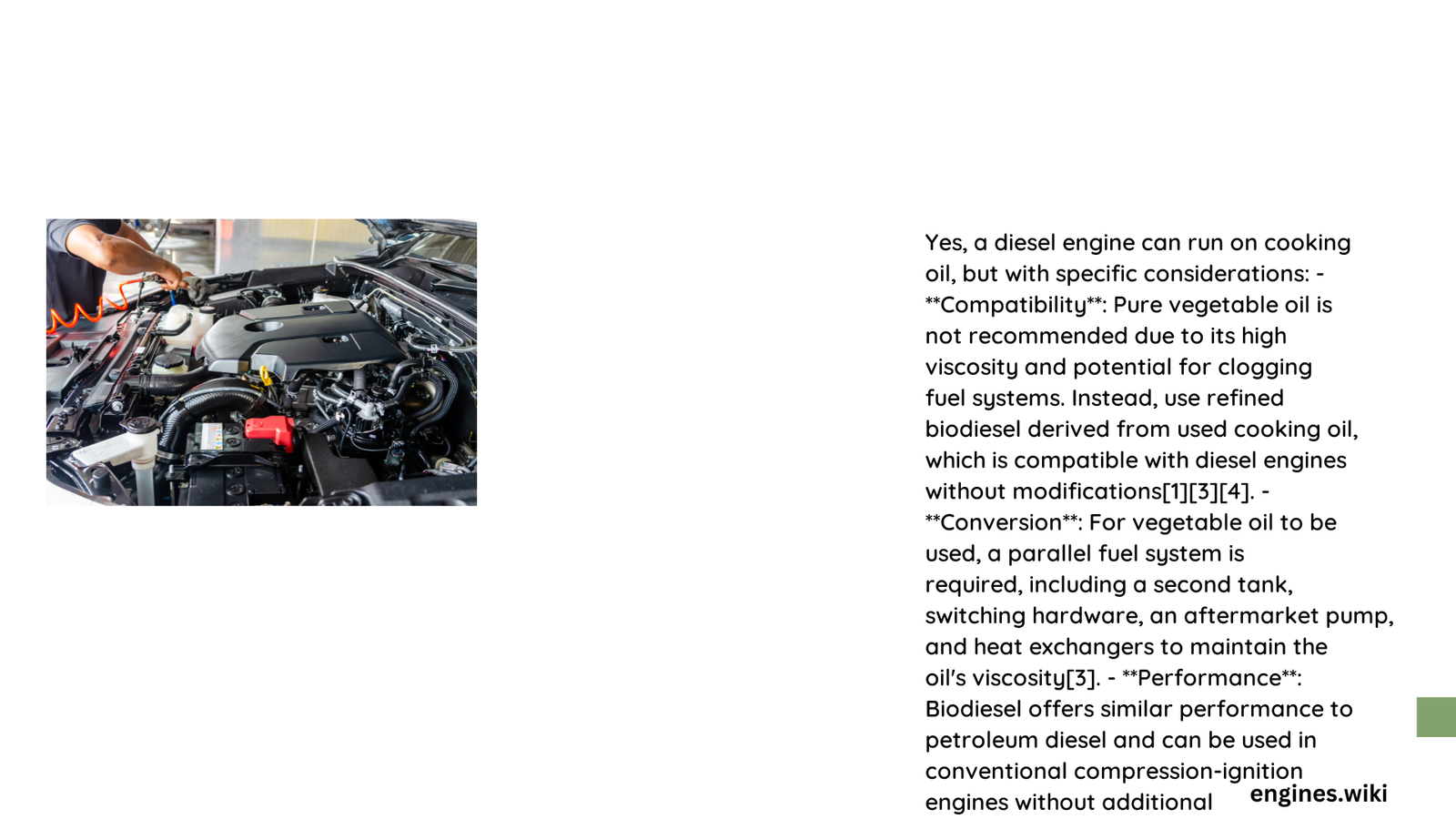Diesel engines can potentially run on cooking oil, but the process is complex and requires specific technical modifications. While pure vegetable oil demands significant engine adaptations, refined biodiesel derived from cooking oil offers a more straightforward alternative fuel solution. Understanding the technical nuances, performance implications, and potential risks is crucial for successful implementation of cooking oil as a diesel engine fuel source.
Can Cooking Oil Directly Power a Diesel Engine?
Cooking oil cannot be used directly in a diesel engine without careful preparation and modifications. The viscosity and chemical composition of raw cooking oil differ significantly from standard diesel fuel, necessitating specialized conversion techniques.
Technical Compatibility Factors
| Fuel Type | Viscosity | Engine Compatibility | Required Modifications |
|---|---|---|---|
| Raw Cooking Oil | High | Low | Extensive |
| Refined Biodiesel | Moderate | High | Minimal |
| Petroleum Diesel | Standard | High | None |
What Modifications Are Essential for Cooking Oil Fuel Conversion?

Heating System Requirements
- Install a dedicated oil heating mechanism
- Warm oil to approximately 160°F for proper flow
- Implement dual-tank fuel system
- Add robust filtration infrastructure
Filtration Protocols
- Initial collection from restaurant/source
- Allow sediment settlement (minimum 7 days)
- Multi-stage filtering process
- Remove water and solid contaminants
- Verify oil clarity and purity
What Performance Implications Exist?
Emission Characteristics
- Reduced greenhouse gas emissions (approximately 78% lower)
- Potential slight increase in carbon monoxide output
- Lower soot production compared to traditional diesel
Economic Considerations
- Potential significant fuel cost reduction
- Variable depending on cooking oil acquisition method
- Free/low-cost waste oil provides maximum economic benefit
What Risks Accompany Cooking Oil Fuel Conversion?
Potential Engine Damage Scenarios
- Fuel pump degradation
- Injector clogging
- Elastomer material stress
- Increased maintenance requirements
Recommended Mitigation Strategies
- Regular system inspections
- Comprehensive filtration
- Professional engine assessment
- Gradual fuel system transition
How to Prepare Cooking Oil for Engine Use?
Biodiesel Conversion Process
- Collect used cooking oil
- Remove water and food particles
- Perform chemical transesterification
- Test fuel quality
- Verify compliance with engine specifications
Technical Performance Metrics
Biodiesel Blend Characteristics
- Cetane number: 54-62
- Kinematic viscosity: Similar to diesel
- Energy density: Slightly lower than petroleum diesel
Expert Recommendations
Best Practices
- Consult professional diesel mechanics
- Start with low-percentage biodiesel blends
- Monitor engine performance closely
- Maintain rigorous maintenance schedule
Conclusion
While diesel engines can technically run on cooking oil through careful conversion and refined biodiesel production, success depends on meticulous preparation, technical understanding, and ongoing maintenance.
